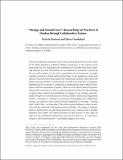Files in this item
"Strange and Twisted Love” : researching art practices in Donbas through collaborative frames
Item metadata
| dc.contributor.author | Donovan, Victoria Sophie | |
| dc.contributor.author | Tsymbalyuk, Darya | |
| dc.date.accessioned | 2022-12-16T00:39:54Z | |
| dc.date.available | 2022-12-16T00:39:54Z | |
| dc.date.issued | 2021-12-16 | |
| dc.identifier | 274947282 | |
| dc.identifier | 08ec9018-9ce1-485a-a4e1-19607aab0cc8 | |
| dc.identifier | 85122507323 | |
| dc.identifier.citation | Donovan , V S & Tsymbalyuk , D 2021 , ' "Strange and Twisted Love” : researching art practices in Donbas through collaborative frames ' , REGION: Regional Studies Of Russia, Eastern Europe, And Central Asia , vol. 10 , no. 1 , pp. 109-135 . https://doi.org/10.1353/reg.2021.0007 | en |
| dc.identifier.issn | 2166-4307 | |
| dc.identifier.other | ORCID: /0000-0001-5987-0965/work/106838146 | |
| dc.identifier.other | ORCID: /0000-0002-8293-5541/work/106838388 | |
| dc.identifier.uri | https://hdl.handle.net/10023/26614 | |
| dc.description | Funding: UK Arts and Humanities Research Council (Grant No. AH/V001051/1). | en |
| dc.description.abstract | From the production portraits of the Soviet avant-garde artists of the 1920s to the bleak depictions of failing Donbas monotowns in the cinema of the perestroika era, the landscapes and communities of Donbas have been repeatedly depicted as exotic abstractions, to be wondered at, emulated, or feared by the rest of the nation. In our role as researchers of such practices, we might consider ourselves to stand outside of the frame, to be engaged in a process of objective deconstruction that exposes the mechanisms of power that inform the politics of representation. In this article, we take issue with this assumption, highlighting the researcher’s complicity in perpetuating subject-object dichotomies, and thus inequalities of power, when we write about cultural representations. We scrutinize our roles in constructing new frames for understanding a region whose cultural representations we engage in our writing, and especially through our own practices of curating creative community engagement projects. Drawing on reciprocal ethnography and collaborative methodologies, we espouse a feminist approach to our topic, “writing for” rather than “writing about” the artists and practitioners whose curatorial work has informed contemporary ideas of Donbas. We engage in dialogue with our interlocutors to collectively deconstruct our creative work on Donbas identities and explore our shared reactions to this process. In this way, we reflect on the mechanisms of framing and exclusion that we -- as researchers, curators, and art practitioners -- inevitably engage in our work, as well as find new ways of constituting meanings collaboratively. | |
| dc.format.extent | 513248 | |
| dc.language.iso | eng | |
| dc.relation.ispartof | REGION: Regional Studies Of Russia, Eastern Europe, And Central Asia | en |
| dc.subject | PG Slavic, Baltic, Albanian languages and literature | en |
| dc.subject | 3rd-DAS | en |
| dc.subject | AC | en |
| dc.subject | NCAD | en |
| dc.subject.lcc | PG | en |
| dc.title | "Strange and Twisted Love” : researching art practices in Donbas through collaborative frames | en |
| dc.type | Journal article | en |
| dc.contributor.sponsor | Arts and Humanities Research Council | en |
| dc.contributor.institution | University of St Andrews. School of International Relations | en |
| dc.contributor.institution | University of St Andrews. Russian | en |
| dc.contributor.institution | University of St Andrews. School of Modern Languages | en |
| dc.identifier.doi | https://doi.org/10.1353/reg.2021.0007 | |
| dc.description.status | Peer reviewed | en |
| dc.date.embargoedUntil | 2022-12-16 | |
| dc.identifier.url | https://muse.jhu.edu/issue/46997 | en |
| dc.identifier.grantnumber | AH/V001051/1 | en |
This item appears in the following Collection(s)
Items in the St Andrews Research Repository are protected by copyright, with all rights reserved, unless otherwise indicated.

